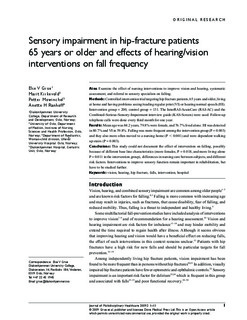Sensory impairment in hip-fracture patients 65 years or older and effects of hearing/vision interventions on fall frequency
Peer reviewed, Journal article
Permanent lenke
http://hdl.handle.net/11250/98853Utgivelsesdato
2009Metadata
Vis full innførselSamlinger
- Artikler / Articles [1185]
Sammendrag
Aim: Examine the effect of nursing interventions to improve vision and hearing, systematic assessment, and referral to sensory specialists on falling.
Methods: Controlled intervention trial targeting hip fracture patients, 65 years and older, living at home and having problems seeing/reading regular print (VI) or hearing normal speech (HI). Intervention group = 200, control group = 131. The InterRAI-AcuteCare (RAI-AC) and the Combined-Serious-Sensory-Impairment interview guide (KAS-Screen) were used. Follow-up telephone calls were done every third month for one year.
Results: Mean age was 84.2 years, 79.8% were female, and 76.7% lived alone. HI was detected in 80.7% and VI in 59.8%. Falling was more frequent among the intervention group (P=0.003)
and they also more often moved to a nursing home (P<0.001) and were dependent walking up stairs (P=0.003).
Conclusions: This study could not document the effect of intervention on falling, possibly because of different base line characteristics (more females, P=0.018, and more living alone P=0.011 in the intervention group), differences in nursing care between subjects, and different risk factors. Interventions to improve sensory function remain important in rehabilitation, but have to be studied further.
